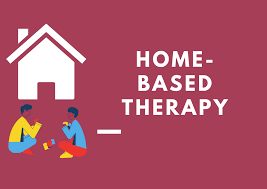When most people think of therapy, they imagine a therapist sitting across from them in an office. However, did you know that there is another type of therapy- one that takes place in the comfort of your own home? Home-based therapy is becoming an increasingly popular option, as more and more people are discovering the benefits it has to offer.
In this article, we will explore what this therapy is, who it can help, how it works, and why you might consider it. We will also hear from experts in the field about their experiences with this type of therapy and provide some resources for those who are interested in learning more.
Contents
Understanding Home-Based Therapy
Home-based therapy is a type of treatment that takes place in the home setting. It involves working with a therapist who comes to your house for sessions. The therapist will work with you and your family to address the issues that are causing you difficulty.
Theory Behind Home-based Therapy
There are several theories behind why home-based therapy might be effective. One theory is that home is a secure and comfortable place for people to express themselves.
In an office setting, people may feel uncomfortable sharing personal information or expressing their emotions. Whereas, home-based therapy allows them to do this in a more comfortable environment.
Postulates of Home-based Therapy
There are also several postulates of this therapy that are worth exploring. These postulates include the following:
- The family is the unit of treatment
- Treatment should be individualized to meet the needs of each person
- Treatment should take into account the culture and values of the family
Ethics of Home-based Therapy
When considering any type of therapy, it is important to consider the ethics of the treatment. This therapy is no exception. Several ethical considerations must be taken into account when providing this type of treatment. These include the following, i.e. the therapist should:
- Respect the privacy of the family and protect their confidentiality
- Maintain boundaries with the family and not become too personally involved
- Be aware of their values and biases and work to avoid imposing these on the family
Home Based Vs. Center-Based Therapy
There are several key differences between home-based therapy and center-based therapy.
- The most obvious difference is that the former takes place in the home, while the latter takes place in an office or clinic.
- Another difference is that the former is usually shorter in duration than the latter. This is because home-based therapy is typically more focused on addressing immediate needs and less on long-term change.
- Finally, the former is usually less expensive than the latter. This is because the therapist does not have to pay for office space or other overhead costs.
History and Development
Home-based therapy has a long history. It was first developed in the early 1900s as a way to treat people with mental illness. The idea behind it was that people would be more likely to recover if they were treated in their own homes.
Unfolding Home-based Therapy

When considering this therapy, it is important to understand that it is not a one-size-fits-all approach. The therapist will work with you and your family to determine what type of treatment would be most effective for you. The therapist will also continue to assess the needs of the family and make changes as needed.
What to Expect
When working with a therapist in your home, there are a few things you can expect.
- First, the therapist will likely want to meet with you and your family for an initial assessment. This is a time for the therapist to get to know you and your family and for you to ask any questions you have about therapy.
- After the initial assessment, the therapist will work with you to develop a treatment plan. This plan will outline the goals of therapy and how they will be achieved.
How Does It Work
Once the treatment plan is in place, the therapist will begin meeting with you for regular sessions. These sessions can last anywhere from 30 minutes to an hour and are typically held once a week.
During therapy sessions, the therapist will work with you to address the issues that are causing difficulty in your life. The therapist may use a variety of techniques, such as talk therapy, art therapy, or play therapy.
Techniques Used In Home-based Therapy
There are a variety of different techniques that can be used in home-based therapy. The therapist will work with you to determine which ones will be most effective for you. Some common techniques include the following:
- Cognitive-behavioral therapy: This type of therapy focuses on helping you to change the way you think about and respond to situations that trigger your anxiety.
- Interpersonal psychotherapy: This type of therapy focuses on helping you to improve your relationships with others.
- Family systems therapy: This type of therapy focuses on helping you to understand and change the dynamics of your family.
The most common technique is family therapy, which involves working with the entire family together. However, there are also individualized therapies, such as art therapy or play therapy.
Evaluating Home-based Therapy

After some time working with a home-based therapist, you and your family will be evaluated to see how well therapy is working. This evaluation can take many forms or ways.
But it typically includes a discussion of the goals of therapy and whether or not they have been met. If therapy is not working, the therapist may make changes to the treatment plan or refer you to another type of treatment.
Benefits of Home-based Therapy
There are many benefits to this therapy. Some of these include:
- One of the most significant benefits is that it allows you to receive treatment in the comfort of your own home. This can be especially helpful for people who are uncomfortable with the idea of going to a therapist’s office.
- Another benefit of home-based therapy is that it can be more flexible than other types of treatment. The therapist can work around your schedule and meet with you at a time that is convenient for you.
- Finally, home-based therapy can be less expensive than other types of treatment.
Limitations of Home-based Therapy
While this therapy has many benefits, there are also some limitations.
- One of the main limitations is that not all types of therapy can be provided in the home. For example, if you are seeking treatment for a substance abuse problem, you will likely need to go to an outpatient treatment program.
- Another limitation of home-based therapy is that it may not be appropriate for all families. If there is a lot of conflict within the family or if someone is unwilling to participate in therapy, then home-based therapy may not be the best option.
Why Consider Home-based Therapy
There are many reasons why you might consider this therapy.
- One of the main reasons is that it can be very effective. Home-based therapy helps treat a wide range of mental health problems, such as anxiety, depression, and eating disorders.
- Another reason to consider home-based therapy is that it can be more convenient than other types of treatment. If you have a busy schedule or if you live in a rural area, it may be easier to find a home-based therapist than one who sees patients in an office.
- Finally, home-based therapy can be less expensive than other types of treatment. If you are uninsured or underinsured, you may be able to find a home-based therapist who is willing to work with you on a sliding scale fee.
Finding a Therapist For HBT

If you are considering home-based therapy, it is important to find a therapist who is a good fit for you and your family. Here are some tips for finding a home-based therapist:
- You can ask your family doctor or mental health provider for a referral, or
- You can search online directories, such as the American Psychological Association’s (APA) directory of psychologists.
Talk to the therapist before making an appointment. Ask them about their experience, training, and what techniques they plan to use in therapy.
What to Look Out For
When looking for a home-based therapist, there are a few things to keep in mind.
- First, make sure that the therapist is licensed and insured.
- Second, be sure to ask about their training and experience.
- Third, check with your insurance company to see if they cover home-based therapy.
- Finally, make sure you feel comfortable talking to the therapist before making an appointment.
- Look for a therapist who has experience treating the problem that you are dealing with.
Red Flags To Avoid
There are a few red flags that you should be aware of when looking for a home-based therapist.
- First, be wary of therapists who claim to have a “cure” for mental health problems.
- Second, be suspicious of therapists who offer to provide therapy without meeting with you first.
- Third, be cautious of therapists who pressure you to sign a contract or make a commitment to treatment before you have had a chance to try it.
- Fourth, be aware of therapists who refuse to give you their credentials or licensing information.
Hearing From Experts

“Home-based therapy can be an effective treatment option for people with anxiety, depression, and other mental health problems.”
-David H. Barlow, Ph.D., ABPP, Founder of the Center for Anxiety and Related Disorders at Boston University
” Home-based therapy is a convenient and affordable option for people who might not otherwise have access to mental health care.”
-Katherine Nordal, Ph.D., APA Executive Director for Professional Practice
Case Study
John is a 38-year-old man who has been struggling with depression for the past year. He has tried medication and therapy, but nothing seems to help. John’s wife suggested that he try home-based therapy.
John was hesitant at first, but he decided to give it a try. He found a therapist who was a good fit for him and began attending weekly sessions.
After a few months of treatment, John’s depression had greatly improved. He was able to return to work and his relationships with his family and friends improved.
Resources
If you are looking for more information on home-based therapy, there are a few resources that you can consult:
- The American Psychological Association’s (APA) directory of psychologists: This directory can help you find a therapist in your area.
- The Association for Psychological Science (APS): Also has a website called Minds in Motion that includes articles and videos about home-based therapy.
- The American Family Therapy Academy (AFTA): It has a website called Home-Based Therapy that provides information about home-based therapy for families.
Conclusion
Home-based therapy is a convenient, affordable, and effective option for treating mental health problems. If you are considering home-based therapy, be sure to find a therapist who is a good fit for you and your family.
A Word From Therapy Mantra
Your mental health — Your psychological, emotional, and social well-being — has an impact on every aspect of your life. Positive mental health essentially allows you to effectively deal with life’s everyday challenges.
At TherapyMantra, we have a team of therapists who provide affordable online therapy to assist you with issues such as depression, anxiety, stress, workplace Issues, addiction, relationship, OCD, LGBTQ, and PTSD. You can book a free therapy or download our free Android or iOS app.



